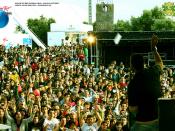The sixties was a time of major political and social change in the western world. These changes were mainly driven by the youth of the time. Their parents had come from life in both the great depression of the early thirties as well as World War II, and were on a whole more conservative than their children which the younger generation mostly refuted. In the early sixties the electronic media, such as Television and radio, became an important communication tool in contrast to the largely print based media of previous decades. With changes came a deep increase in the exchange of knowledge, ideas, and information, which triggered a generation to become much more active in politics and other affairs affecting them than what the previous generations would have been. The youth culture meant to change all of the contradictions that remained unchanged from their parent's culture. Although illustrations of this shift for change and progress included politics, religion, class struggle, racial issues, and the Vietnam War, the area in which this change was most visible was in the arena of popular music, which too had become a tool for the communication of ideas.
James Douglas (aka Jim) Morrison was born in Melbourne, Florida on December 8t, 1943. He was the son of a Rear-Admiral, whose father, grandfather, and family all had lifetime careers in the Navy. This suggests a strict and militaristic upbringing, with the assumption being that the young Morrison would be a career Navy officer like his ancestors. Obviously, Morrison came from the kind of household that the youth culture was rebelling against. Perhaps this was one of the causes of Morrison's open rebellion. When he had finished school, he moved to California, where he enrolled in the theatre department of the University College of Los Angeles (UCLA),


